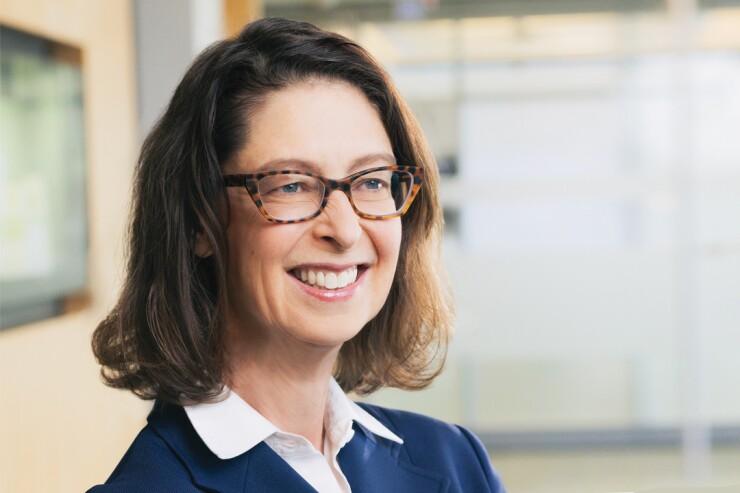
For Abigail Johnson, chairman and CEO at Fidelity Investments, family and business are inextricably entwined.
Her grandfather founded the Boston-based mutual fund in 1946, some 30 years before her father took over the business and grew it into one of the world's largest financial services firms. Today, Fidelity has $4.5 trillion in client assets.
Johnson joined the family business in 1988, becoming its CEO in 2014 and chair two years later. Since then, she has continued to push Fidelity to expand. Last year, the company reported $25.2 billion in revenue — a 5% uptick from 2021. And it marks the company's sixth consecutive year of record earnings.
But Johnson's most notable move this past year hasn't been about maximizing profits. She's been focused on how to engage young and increasingly diverse investors who are digital natives.
"We need to eliminate all the anti-digital stuff that is still common across the financial industry," Johnson said. "Fidelity is committed to removing barriers and investing in the people and technology needed to deliver an outstanding customer experience."
To accommodate how both tech-savvy and old-school investors prefer to connect with the company, it has been embracing a hybrid model that lets customers choose how to engage, whether that's in person, on social media, over the phone or via digital chats.
"That sets Fidelity apart and is driving growth across all customer accounts and engagement," Johnson said.
In the second quarter, the company recorded 530% more social media service interactions than the year before. In that same period, 23 million customers engaged with Fidelity digitally through web and mobile platforms, a 7% year-on-year increase.
That uptick in digital engagement is reflected in the number of booked interactions and appointments in the second quarter — up 31% and 20%, respectively, year-on-year.
Along with connecting with more investors digitally, Johnson has been cutting out paper mail and conducting in-house research into how the company might gain from emerging technologies like artificial intelligence, quantum computing and virtual reality.
Additionally, she has continued spearheading Fidelity's foray into the digital asset space.
On the heels of similar efforts, such as the platform launched in 2018 for institutional investors to custody and trade bitcoin, Fidelity started letting plan sponsors add digital assets to their 401(k) lineups in early 2022. And earlier this year, the company began letting retail investors trade bitcoin and ethereum.
Meanwhile, Fidelity has been adding to the tens of billions in assets that firms have converted to exchange-traded funds since 2021.
In June, the company announced plans to convert six of its thematic mutual funds to ETFs. The following month, it refiled paperwork with the Securities and Exchange Commission to launch a spot bitcoin ETF, entering a race to drive the product against competitors like the New York-based investment manager BlackRock.
Johnson said that push, which has been accompanied by new alternative investment offerings in private equity, private credit, real assets and liquid alternatives, has helped Fidelity meet "advisors' increasing interest in alternative investment options that offer portfolio diversification outside of traditional asset classes."
Increasingly, the new customers coming to Fidelity are younger and more diverse.
Investors between the ages of 18 and 35 accounted for 43% of all new retail accounts opened in the second quarter, while the number of young investors with individual retirement accounts rose 34% from the year before.
The influx of more diverse clients is also helping Johnson make good on her long-time campaign to bolster the number of females who invest through her company. Fidelity works with 17 million female investors across its business, a 24% uptick in female customers from 2019.
To promote financial inclusion and economic mobility among the general public, in January, the firm launched a $250 million college scholarship and support program for up to 50,000 students who are Black, Latino or from underserved communities. This coincides with the firm's attempts to hire more women and people of color, including by recruiting talent from more diverse regions beyond its brick and mortar locations.
"Fidelity is committed to continually strengthening diversity and inclusivity to build a diverse workforce that matches its growing customer base and the communities that Fidelity serves," Johnson said.
As part of that effort, Fidelity is also helping fund employees' education. The company offers associates a fully funded undergraduate degree benefit and helps them pay down up to $15,000 per month in student loan debt.
"[We] will continue to focus on providing access and education for all, especially amid the increasing interest from the next generation of investors," Johnson said.
Another key to optimizing the employee experience has been promoting intercompany mobility and encouraging associates to try out different positions across the firm, Johnson said.
But Fidelity isn't just interested in its own associates — it wants to help advisors across the industry.
In response to a growing trend of working from home — which Fidelity executives have said could hamper how advisors make professional connections — the company launched a peer-to-peer platform in April called "Finteract," which is designed to boost how advisors across the industry network, share insights and find mentors.
"[That's] increasing ways that the next generation of financial advisors can grow their firms," Johnson said.
As Johnson nears the end of her first decade as CEO and chairman of her family business, she is looking forward to watching Fidelity and the industry grow..
"Going forward, our focus remains the same: to expand relationships with existing customers throughout their lifetime with new, relevant products and differentiated services and experiences," Johnson said.





